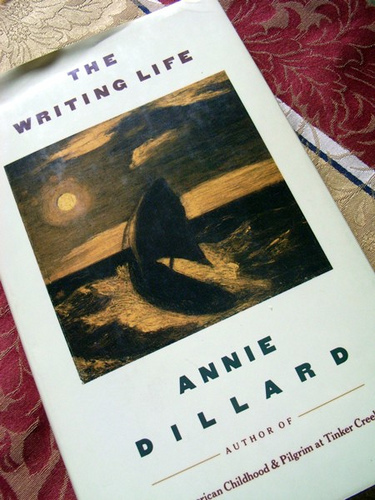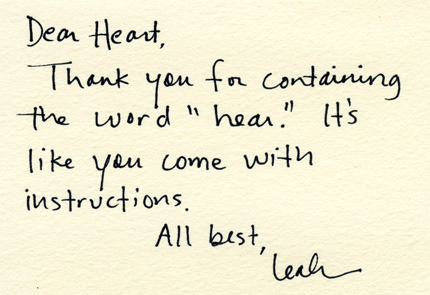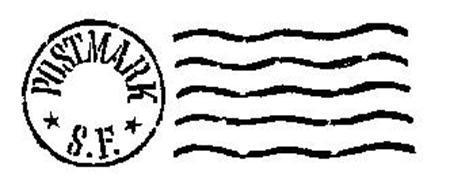Drew Myron's Blog, page 68
October 1, 2012
Too Many Annies (and other confusions)

Why are we reading, if not in hope of beauty
laid bare, life heightened
and its deepest mystery probed?
. . . We still and always want waking.
― Annie Dillard
The Writing Life
I'm late to the party, again.
I just now read The Writing Life by Annie Dillard. It's a stellar collection of essays, and is considered a sort of writer's manifesto. When writers gather, it is this book they quote, or worse — for the uninitiated like me — they give a subtle nod, a slight gesture to suggest their knowing is so deep as to not require enthusiasm. The seminal work was published in 1989, and I just now read it.
And you want to know why?
I resist hype. If everyone is raving about something, I usually walk away. Examples: maxi skirts, mainstream movies. Exceptions: Fifty Shades of Grey (don't judge, I was curious), and the sale rack at Anthropologie.
But more honestly, I confused Annie Dillard with Annie Proulx.
When writers trilled over Dillard, my mind hit ignore. I recalled the long slog through The Shipping News, and couldn't bear another grey and dismal tale set in some grey and dismal hinterland. When the book won the Pulitzer, I abandoned my "don't be a sheep" mantra, and embarked on the longest, most laborious, read of my life.
But here's the rub: The Shipping News is a novel by Annie Proulx. Not Annie Dillard.
All these years, in my haste to gather, read, learn and log, I had confused the two Annies.
But wait — the admission deepens.
I also confuse the two Richards: Richard Russo and Richard Ford. Both accomplished contemporary novelists. Both with the same dang name. Too many times to count, I have bought and borrowed a book by Richard Ford thinking it was Richard Russo, and vice versa. Just as I am sinking into the couch with book and enthusiasm, I realize it's not "my" Richard, but the other, less favored, one.
And don't even start about multiple book covers. How many times have I bought a book by Elizabeth Berg, thinking it was one I had somehow managed to never read, then realized just a few pages in that, yes, in fact, I had already read the book.
So, what's the lesson, the message?
1.
If you're a writer, pick a unique pen name.
Too many Richards confuses dimwits like me.
2.
If you're a reader, slow down.
Admittedly, I spend much of my life skimming. I call it getting the gist. This annoys my husband to no end. He's a slow, take-it-all-in-and-remember reader. Conversely, I read quickly and retain little, which explains, well, everything.
3.
Read The Writing Life.
It's a really good book by Annie somebody.
September 27, 2012
Thankful Thursday: Door
 Lexi White photo
Lexi White photo
Opening one door, a friend tells me, opens another.
All week I see doors.
A friend shares a poem with me. I like it, fold it, carry it in my purse.
Later, I am in a cafe with another friend. Let's write, we say, and I pull out the poem as a prompt. The room buzzes with conversation and our small table is crowded with spent cups, dirty spoons. We lean in, heads bent, to read the poem aloud. Ohh, that line, we say, and this image. We are moved, lifted. We have opened a door. Pens move across pages. We walk new rooms. We feel possible.
If the doors of perception were cleansed, wrote William Blake, everything would appear to man as it is, infinite.
The line itself is a door. Jim Morrison's band, The Doors, took its name from Aldous Huxley's book The Doors of Perception, the title of which was a reference to a line in Blake's book, The Marriage of Heaven and Hell.
All these doors, these openings to more.
What if we saw every moment as a door. Which would we welcome, walk through, wander? And to what would our wonder lead?
It's Thankful Thursday!
Gratitude. Appreciation. Praise.
Please join me in a weekly pause to appreciate the people, places & things that bring joy. What are you thankful for today?
September 22, 2012
Instead of an MFA: 7 Online Options

We're not all academics.
We're working — in bookstores and banks, in law firms and libraries. We're selling insurance, clothes, coffee, and cars. We're tending children, and parents, and bars. We're writing, whenever and wherever we can.
We thirst to improve. But not every writer has the time, money, or life circumstance to pursue a graduate degree.
Every fall Poets & Writers magazine presents the MFA Index, an exhaustive overview of schools offering Master of Fine Arts degrees in writing. In 1936, University of Iowa offered the first. Now, more than 200 schools have MFA programs.
But what about the rest of us? Is there an alternative to the MFA?
How do we hone our skills? Where do we go to stretch and improve our writing? Let's explore some options. Today we'll start with Online Writing Classes. While a single course is no substitute for a two or three-year degree, several organizations offer sophisticated and valuable writing classes. Here's a round-up of respected organizations offering quality online instruction.
7 Online Writing Classes
Cambridge Writers' Workshop
Offering creative writing courses running six to 10 weeks, in a variety of genres.
Chicago School of Poetics
Offering online classes fostering innovative poetics. Students use visual web conferencing, desktop sharing, and collaborative whiteboards. The school offers "an alternative to, and a community beyond, the Creative Writing MFA."
Gotham Writers' Workshop
With more than 7,000 students annually, this New York-based organization is one of the most popular writing resources. Their interactive classes have been named Best of the Web by Forbes magazine. Six and 10 week workshops available in seemingly every genre.
The Loft Literary Center
Classes for adult and youth, online and on-site, all writing genres. Serves beginning, intermediate and advanced writers.
Stanford Continuing Studies
The Writer's Studio offers approximately 20 courses every quarter in the principal genres of creative writing— novel, short story, poetry, creative nonfiction, and screenwriting. All writing levels welcome.
WoodSprings Institute
University-level literary instruction, offering workshops in poetry, short story, novel, creative non-fiction, and memoir. Also: manuscript mentoring and MFA prep courses.
Workshops with Molly Fisk
Poet Molly Fisk pioneered Poetry Bootcamp, a five-day poetry intensive, and also offers A Voice of Your Own, a six-week workshop exploring prose, poetry and more.
Have you taken an online writing class? Have you taken a class with any of these organizations, or others? Tell us about it!
September 20, 2012
Thankful Thursday
I wonder if gratefulness is the bridge
from sorrow to joy, spanning the chasm
of our anxious striving. Freed from the burden
of unbridled desires, we can enjoy what we have, celebrate what we've attained, and appreciate the familiar. For if we can't be
happy now, we'll likely not be happy when.
- Philip Gulley
Porch Talk
September 16, 2012
Sunday Prayers
I don't care if it's a doorknob,
my mother said,
You gotta believe in something.
Her voice was angry but I was a petulant teen and it took me years to hear the sadness she felt. I know now that she wanted me to believe in something bigger than myself, to see beyond the smallness of me.
Today I'm pondering the beauty of doorknobs, knowing that belief is big enough to encompass doubt, and doubt leads to searching, and searching leads to wonder, and wonder leads to . . . anything, everything.
I like how Czeslaw Milosz calls belief, or prayer, a velvet bridge.
On Prayer
You ask me how to pray to someone who is not.
All I know is that prayer constructs a velvet bridge
And walking it we are aloft, as on a springboard,
Above landscapes the color of ripe gold
Transformed by a magic stopping of the sun.
That bridge leads to the shore of Reversal
Where everything is just the opposite and the word 'is'
Unveils a meaning we hardly envisioned.
Notice: I say we; there, every one, separately,
Feels compassion for others entangled in the flesh
And knows that if there is no other shore
We will walk that aerial bridge all the same.
- Czeslaw Milosz
Still, I am a searcher, questioning my faith even while firmly believing. Jane Mead's poem, Concerning the Prayer I Cannot Make, speaks to this very conundrum, and in a frank tone I appreciate (and that last stanza - wow!):
Concerning the Prayer I Cannot Make
Jesus, I am cruelly lonely
and I do not know what I have done
nor do I suspect that you will answer me.
And, what is more, I have spent
these bare months bargaining
with my soul as if I could make her
promise to love me when now it seems
that what I meant when I said "soul"
was that the river reflects
the railway bridge just as the sky
says it should—it speaks that language.
I do not know who you are.
I come here every day
to be beneath this bridge,
to sit beside this river,
so I must have seen the way
the clouds just slide
under the rusty arch—
without snagging on the bolts,
how they are borne along on the dark water—
I must have noticed their fluent speed
and also how that tattered blue T-shirt
remains snagged on the crown
of the mostly sunk dead tree
despite the current's constant pulling.
Yes, somewhere in my mind there must
be the image of a sky blue T-shirt, caught,
and the white islands of ice flying by
and the light clouds flying slowly
under the bridge, though today the river's
fully melted. I must have seen.
But I did not see.
I am not equal to my longing.
Somewhere there should be a place
the exact shape of my emptiness—
there should be a place
responsible for taking one back.
The river, of course, has no mercy—
it just lifts the dead fish
toward the sea.
Of course, of course.
What I meant when I said "soul"
was that there should be a place.
On the far bank the warehouse lights
blink red, then green, and all the yellow
machines with their rusted scoops and lifts
sit under a thin layer of sunny frost.
And look—
my own palm—
there, slowly rocking.
It is my pale palm—
palm where a black pebble
is turning and turning.
Listen—
all you bare trees
burrs
brambles
pile of twigs
red and green lights flashing
muddy bottle shards
shoe half buried—listen
listen, I am holy.
- Jane Mead
I found these gems in Poems to Live By in Uncertain Times. Sometimes I need a "sign," and today, stumbling upon these poems, I found proof that poetry really is a form of prayer.
September 13, 2012
Thankful Thursday: Said & Saved
 On this Thankful Thursday, I am thankful for years and years of things I've heard. Like a catalog, I can call on the wisdoms, cries, flip remarks, these turning points.
On this Thankful Thursday, I am thankful for years and years of things I've heard. Like a catalog, I can call on the wisdoms, cries, flip remarks, these turning points.
We can never know what words will stick, what words will sing or pierce and sting. Is it this unknowing that helps us hold our tongues, or, for better or worse, rush our words?
Things Heard
I don't believe in the institution of marriage.
Go play in traffic.
You don't need to be good.
This is temporary.
Standing in the apartment,
a wall of windows and a flush of light,
Here, I gushed, I could be a real writer.
If you're a writer, he said, you'll write.
Stung, I didn't move in.
Across town,
from a darker
cheaper
basement
I began to write.
Sugar, salt, sugar — the recipe for resolution.
Your call is important to us.
Let's play library. We start by being very quiet.
I miss you.
I do.
It's Thankful Thursday, a weekly pause to appreciate the people, places and things that bring joy. What are you thankful for today?
September 10, 2012
Swings between two poles

Instructions, exactly
Take this medicine
on an empty stomach
preferably half to one hour
before breakfast. Take this
medicine with a full glass
of water. Take this medication
at least four hours before
taking antacids, iron
or vitamins
or minerals
or supplements.
Take or use this medicine
exactly as directed. Do not
skip doses or discontinue
unless directed by your
doctor. Take this
medicine exactly
as directed.
Do not skip
doses.
- Drew Myron
This is a found poem. A whole text, lifted from my medicine bottle and reformed — with line breaks providing places to pause — into art.
Some days material is at every turn: in newspapers, dictionaries, speeches, textbooks, manuals. Find poetry in the everyday, I often say.
With this avalanche of words, I usually lift and rearrange (a collage poem is born!), or sometimes I simply erase, but on rare days a poem is whole-cloth and sitting on my bathroom sink.
The found poem, according to the Academy of American Poets, shares traits with Pop Art, such as Andy Warhol's soup cans. Poetry, like art, is the invention of reinvention. In Mornings Like This, a collection of found poems, Annie Dillard says that turning a text into a poem doubles that poem's context. The original meaning remains intact, she writes, but now it swings between two poles.
Swings between two poles.
Yes, poetry holds that sort of magic — the mysterious ability to say one thing while reaching for another.
September 6, 2012
Thankful Thursday

Oh Leah, thank you for these notes — quirky, tender, soft and sharp — reminding me of the little things that make life big. Thank you.
It's Thankful Thursday, a weekly pause to appreciate people, places and things that bring joy. What are you thankful for today?
September 2, 2012
What I Found
At the intersection of poetry, art & heart, I found treasure.
Healing Stanzas is a collaborative project between Kent State University's Wick Poetry Center and Glyphix design studio. This series combines the creative talents of KSU Visual Communication Design students with student writers (grades 3–12), health care providers, medical students, patients, and veterans to encourage dialogue about the connection between art and medicine, writing and healing.
Things That Have No Name was written by the Psychiatric Intensive Outpatient Therapy Group at Summa Health System in Akron, Ohio. View more of these animated poems, along with posters and notecards, at Traveling Stanzas.
August 30, 2012
Thankful Thursday: In a pause
 A friend emails me a poem each week, along with a one-page background on the poet, which she researches and writes. She's not a poet (she says) but she appreciates poetry.
A friend emails me a poem each week, along with a one-page background on the poet, which she researches and writes. She's not a poet (she says) but she appreciates poetry.
She sends a mixed bag of poets I know and don't. This week a Latino poet. Last month a New Zealander. I'm always learning.
I know there are organizations that provide this same service, but I like thinking of this one person — whom I've met only once and briefly — each week thoughtfully choosing a poem and sharing its story with me and others. I like that one poem, lovingly shared by one person, can tie us all together in a poetic pause.
Thank you Vicki.
This Week's Poem (No. 382):
In Colorado My Father Scoured and Stacked Dishes
in a Tex-Mex restaurant. His co-workers,
unable to utter his name, renamed him Jalapeño.
If I ask for a goldfish, he spits a glob of phlegm
into a jar of water. The silver letters
on his black belt spell Sangrón. Once, borracho,
at dinner, he said: Jesus wasn’t a snowman.
Arriba Durango. Arriba Orizaba. Packed
into a car trunk, he was smuggled into the States.
Frijolero. Greaser. In Tucson he branded
cattle. He slept in a stable. The horse blankets
oddly fragrant: wood smoke, lilac. He’s an illegal.
I’m an Illegal-American. Once, in a grove
of saguaro, at dusk, I slept next to him. I woke
with his thumb in my mouth. ¿No qué no
tronabas, pistolita? He learned English
by listening to the radio. The first four words
he memorized: In God We Trust. The fifth:
Percolate. Again and again I borrow his clothes.
He calls me Scarecrow. In Oregon he picked apples.
Braeburn. Jonagold. Cameo. Nightly,
to entertain his cuates, around a campfire,
he strummed a guitarra, sang corridos. Arriba
Durango. Arriba Orizaba. Packed into
a car trunk, he was smuggled into the States.
Greaser. Beaner. Once, borracho, at breakfast,
he said: The heart can only be broken
once, like a window. ¡No mames! His favorite
belt buckle: an águila perched on a nopal.
If he laughs out loud, his hands tremble.
Bugs Bunny wants to deport him. César Chávez
wants to deport him. When I walk through
the desert, I wear his shirt. The gaze of the moon
stitches the buttons of his shirt to my skin.
The snake hisses. The snake is torn.
It's Thankful Thursday, a weekly pause to appreciate people, places, things (and poems). Joy contracts and expands in proportion to our gratitude. What makes your world expand?



